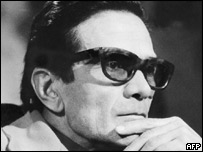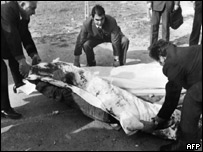|
By Benedetto Cataldi
BBC Monitoring
|


Pasolini was one of the greats of Italian cinema
|
Investigators in Rome have reopened the inquiry into the murder of Italian film director Pier Paolo Pasolini in November 1975.
It follows statements about the director's death made by the man imprisoned for nine years for his murder and by a close former aide.
Pino Pelosi told a TV station he did not kill Pasolini but three other young people "with a southern accent" did.
Many in Italy have questioned the circumstances of Pasolini's death.
According to Mr Pelosi's new version of events - given in an interview to state broadcaster TV Rai Tre on Saturday - on 2 November 1975, three unnamed men beat Pasolini to death on a beach in the deprived Rome suburb of Ostia, shouting abuse and insults such as "dirty communist".
High-profile figure
Pasolini was a high-profile Marxist intellectual and many in Italy at the time believed this was a political murder, rather than a case of events spinning out of control in Rome's homosexual underworld - the version endorsed by subsequent inquiries.
But Sergio Citti, a film director who worked with Pasolini closely, has given yet another version of the events in an interview with the Rome daily newspaper La Repubblica.
According to Mr Citti's claims, five men murdered the director 30 years ago.
He said: "Pino Pelosi was only a boy. He acted as a bait for those five. They only used him, they needed somebody to blame for the crime.
"Pelosi had to play the game played by these people, the 'respectable' people who ordered the murder".

His body was found in Rome in November 1975
|
According to Mr Citti, who says he has a source who knows the truth about the murder, Pasolini was murdered elsewhere and then his body dumped on the beach near Rome where he was found.
He also believes the Pasolini murder was a political conspiracy: "His death was convenient to many, to all those who were afraid of his mind and free spirit."
Violent decade
The 1970s were a violent decade in Italy, with opposing groups of neo-Fascists and communist guerrillas committing many murders and several other atrocities exclusively in the name of ideology.
Pasolini is also thought to have received death threats from neo-Fascists over his last film, Salo, or the 120 Days of Sodom. It depicted a perverse wartime Fascist state in northern Italy led by Benito Mussolini.
The new allegations have also caught the attention of the political world.
A group of 30 MPs has presented an interrogation in parliament to ask Prime Minister Silvio Berlusconi what steps he intends to take.
Meanwhile, the Rome municipality is presenting itself as a plaintiff in the new investigation.
Rome Mayor Walter Veltroni, a left-winger, has said that "Pelosi's statements rekindle doubts and questions which the poet's friends, many intellectuals and a good part of the public opinion have always had on what really happened that night".
Pasolini was an all-round intellectual, not only a film director: he was also a well-known poet, novelist, journalist, playwright.
But outside Italy he is remembered especially for his gritty film-making.
He is often though to be the last giant of the golden age of Italian cinema in the post-war years, and his name his often mentioned in the same breath as artists such as Visconti, Fellini, Rossellini and De Sica.